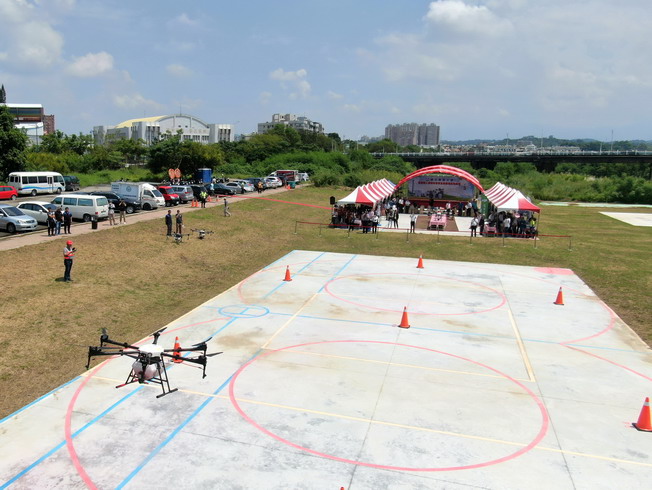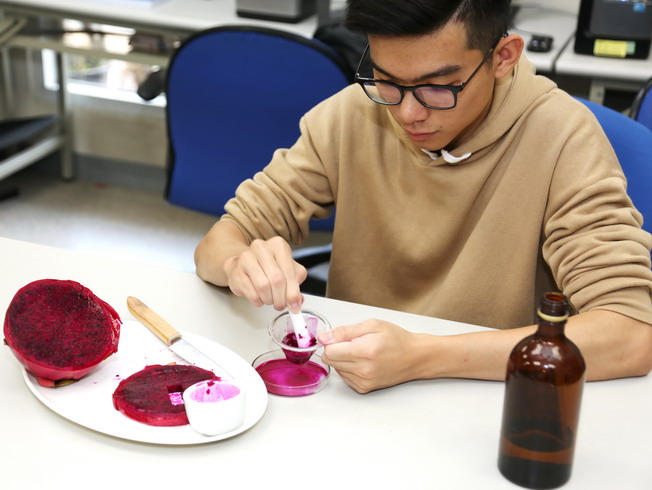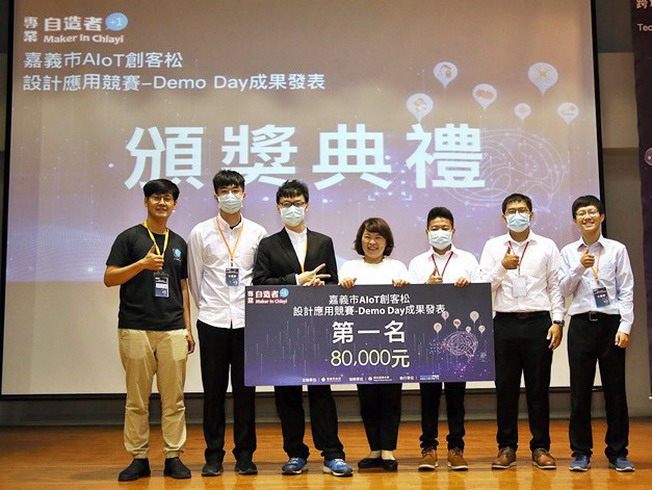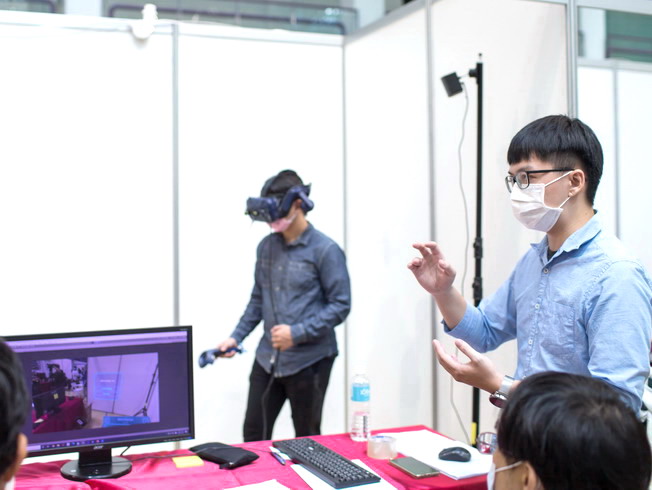| |
 |
News |
 |
Browsing: 1699 times

|
Date:2021-04-26
Bracket:2021 Feature
Department:ncyu
|
 Innovative Interdisciplinary Cooperation: A Step Forward for Intelligent Technology
Innovative Interdisciplinary Cooperation: A Step Forward for Intelligent Technology
The NCYU College of Science and Engineering features basic science and applied science, and consists of eight departments: Electrophysics, Applied Chemistry, Applied Mathematics, Computer Science and Information Engineering, Biomechatronic Engineering, Civil and Water Resources Engineering, Electrical Engineering, and Mechanical and Energy Engineering. In addition to basic research and abundant research and development in line with the technological trend, the departments of the college, benefiting from NCYU’s agricultural technology and biotechnology expertise, work together to form an interdisciplinary research team. By demonstrating remarkable expertise in science and engineering, they dedicate themselves to facilitating the development of biology and agriculture-related technology. They hope to cultivate professionals for Taiwan’s high-tech intelligent industry by evolving agricultural production technology with smart technology with the times.
Department of Electrophysics
The educational goal of the Department of Electrophysics is to provide students with a solid foundation in physics and electronics-related training. It is devoted to professional research and curriculum planning with special focus on “optical science” and “semiconductor electronics. ” In addition to solid training in basic physical science, it pays attention to students’ practical experience in laboratory projects, practical skills and the ability to analyze theoretical problems. After graduation, the students may join the workforce in such industries as electronics, semiconductors and optoelectronic technology. They may also complete credits in pre-service education courses of physics teachers in the categories of national elementary or secondary schools during college, and serve as physics teachers in elementary, junior or senior high schools after graduation. As green energy technology is key to the country’s industrial upgrading, and an indicator for future economic development, the department contributes to featured research projects on green technology with special focus on light-emitting diodes and solar cells. The department co-founded the green energy program with the Department of Mechanical and Energy Engineering. The program introduces students to the latest technological developments with a view to matching skills and training with industry needs, thus enhancing students’ competitiveness in the job market.
Department of Applied Chemistry
The Department of Applied Chemistry aims to provide students with sufficient knowledge in chemistry through courses on basic chemistry and practical techniques. By providing abundant educational and industrial resources, they hope to enhance students’ independent thinking, professional skills and interdisciplinary competence via a wide variety of courses and experiments. After graduation, the students may pursue a career in the industries of materials, optoelectronic semiconductors, analysis and testing and pharmaceuticals. They may also teach at secondary schools or universities. Professional studies are centered on chemistry, encompassing latest trends in contemporary technology and industrial development with emphasis on the synthesis, analysis, sensing and characteristics of materials, biology, medicine, agriculture, energy and related substances. To reduce the education-job mismatch, in addition to diversification of courses, the department also invites experts with years of practical experience from relevant industries to share their experience and current development of industrial application technology.
The faculty is committed to research ranging from medical and agricultural drug synthesis, material synthesis, analytical chemistry to biochemistry. After numerous experiments, Prof. Ming-Der Su from the department successfully found a special catalyst containing Si atoms, which can effectively and selectively break a certain chemical bond. The chemist believes that if a chemical bond can be broken and rejoined other chemical bonds to make the desired chemical molecule at will, it can be adopted to mass-produce substances of synthetic chemistry or pharmaceutical chemistry required for consumer products. It can even help solve issues such as environmental pollution and climate change. Associate Prof. Jiann-Jyh Huang conducts studies on novel metal-catalyzed tandem reactions, which can be used to synthesize various tetracyclic heterocycles, as precursors for the development of new targeted anti-cancer drugs. The research results were published in international journals.
Department of Applied Mathematics
In addition to teaching, research and practical applications in basic mathematics for science, the Department of Applied Mathematics characterizes itself from the mathematics departments of other public and private universities in Taiwan by integrating three teaching and research teams: computing science, information science, and probability statistics. Together, they contribute to comprehensive development in teaching, research, design and manufacturing, and help facilitate technology transfer and industrial technology cooperation with interdisciplinary technology integration and research and development. The applied research covers micro-nano computing simulation, cloud computing, dynamic system simulation, scientific calculation and modeling, information digital content, artificial intelligence and applied information software components, biostatistics, industrial statistics, quality control, popular mathematics, data science, etc. After graduation, the students may seek jobs in design and development of mathematics or information software (teaching aids), biotechnology, industrial design, financial analysis, quality control, insurance actuarial, and mathematics education, among others. The students may also pursue further studies by applying to graduate programs in applied mathematics, information engineering, statistics, finance, industrial engineering and mathematics education.
Department of Computer Science and Information Engineering
As a high-growth industry, information engineering is a core development goal worldwide. In the coming decades, information professionals will remain in short supply. The main development goals consist of three major domains: software engineering and knowledge engineering, interactive multimedia, and network and information security. It involves the integration and application of technological innovations such as artificial intelligence, Internet of Things, information security, knowledge engineering and software engineering. The department is devoted to enhancing interdisciplinary cooperation between smart agriculture and information technology, complete with key research areas such as NCYU’s agricultural technology or life sciences. Some examples include: developing precise environmental control of Phalaenopsis and intelligent detection systems for fertilizer irrigation and quality grading, estimating milk production of dairy cows with deep learning and applying image information for classification and categorization of Aiwen mangoes, evaluating under-forest beekeeping resources in the experimental forest farm and developing the anti-theft and warning system for bee farms, carrying out automatic identification of chicken distribution using object detection and grouping technology, etc. All these bear witness to the dazzling research results in the development of smart agriculture.
The domestic industry in Taiwan not only focuses on semiconductor and IC design, but smart software and communication systems, which include, for instance, cloud, smart mobile devices, (wearable) Internet, robots, interactive bionic systems, and bioinformatics (integration) systems. The department aims to equip students with relevant high-level skills, who may join the workforce
|



|
 |

|
 |
|
 |
 |
|


 ][
][